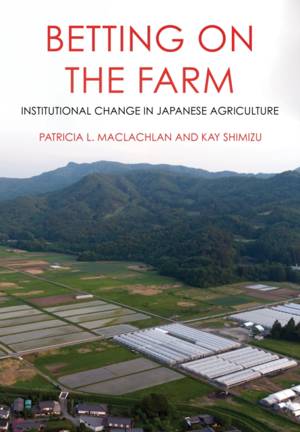
- Retrait gratuit dans votre magasin Club
- 7.000.000 titres dans notre catalogue
- Payer en toute sécurité
- Toujours un magasin près de chez vous
- Retrait gratuit dans votre magasin Club
- 7.000.000 titres dans notre catalogue
- Payer en toute sécurité
- Toujours un magasin près de chez vous
Betting on the Farm
Institutional Change in Japanese Agriculture
Patricia L MacLachlan, Kay ShimizuDescription
Japan Agricultural Cooperatives (JA), a nationwide network of farm cooperatives, is under increasing pressure to expand farmer incomes by adapting coop strategies to changing market incentives. Some coops have adapted more successfully than others. In Betting on the Farm, Patricia L. Maclachlan and Kay Shimizu attribute these differences to three sets of local variables: resource endowments and product-specific market conditions, coop leadership, and the organization of farmer-members behind new coop strategies.
Using in-depth case studies and profiles of different types of farmers, Betting on the Farm also explores the evolution of the formal and informal institutional foundations of postwar agriculture; the electoral sources of JA's influence; the interactive effects of economic liberalization and demographic pressures (an aging farm population and acute shortage of farm successors) on the propensity for change within the farm sector; and the diversification of Japan's traditional farm households and the implications for farmer ties with JA.
Spécifications
Parties prenantes
- Auteur(s) :
- Editeur:
Contenu
- Nombre de pages :
- 258
- Langue:
- Anglais
Caractéristiques
- EAN:
- 9781501762123
- Date de parution :
- 15-03-22
- Format:
- Livre relié
- Format numérique:
- Genaaid
- Dimensions :
- 152 mm x 229 mm
- Poids :
- 535 g







